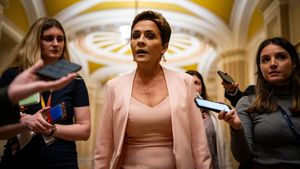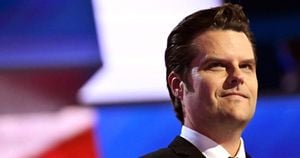President-elect Donald Trump’s selection of Fox News host Peter Hegseth as his nominee for Defense Secretary has sparked intense debate and serious concerns among military veterans and political analysts alike. The announcement surprised many, even those close to Trump, as it signifies a shift from traditional picks typically seen for such high-profile positions. Hegseth, who is well-known for his conservative views and television persona, has been outspoken on issues such as military readiness and his opposition to what he calls 'woke' policies within the armed forces.
Retired Four-Star General Barry McCaffrey voiced his concerns about Hegseth's nomination during his appearance on KIRO Newsradio’s "The Gee and Ursula Show." McCaffrey stated, "Hegseth is eminently qualified to be Secretary of Defense. The question will be the policies he supports along with Trump." This comment highlights the dual nature of Hegseth's candidacy; on the one hand, his military background as an Army National Guard officer and veteran could be seen as advantageous. On the other, his views on significant matters, like gender roles within the military, are alarming to some.
Hegseth’s criticism of women serving in combat raises flags for those who advocate for gender equality within military ranks. McCaffrey, who has actively supported women's integration in the armed forces, remarked, "Reversing or questioning the contributions of women is a serious mistake. Women are fully integrated, maintaining gender-neutral standards." During his tenure, he asked leaders whether they would prefer an all-male fighting force over a mixed-gender one; every leader responded with disinterest toward returning to those days. This sentiment casts Hegseth's views as out of step with the current military philosophy.
Further complicate matters is Hegseth's controversial stance on traditional NATO alliances and support for Ukraine. McCaffrey pointed out the precarious nature of Trump's relationship with Russian President Vladimir Putin, implying this might translate to less American support for Ukraine. He expressed concern over Trump’s tendency to favor authoritarian figures, stating, "It’s appalling to see the favorable light many Trump supporters cast upon Russia and its actions under Putin."
While Hegseth lauds diversity as strength within the military, he has expressed skepticism over the effectiveness of women compared to men. These remarks have drawn harsh criticism. Senator Tammy Duckworth, who has personal experience serving as a combat pilot, articulated her disapproval of Hegseth’s views, stating, "It demonstrates how out of touch he is with modern warfare if he thinks we can separate genders during combat situations." Duckworth, who lost her legs due to combat injuries, has emphasized the integral role women play within military operations.
Hegseth’s confirmation for Secretary of Defense could potentially face significant obstacles within the Senate, where his lack of experience and unconventional path to such a pivotal role may be met with skepticism. Although he has carried out military service as an infantry officer, many doubt whether his background aligns well with governing the Department of Defense, which oversees millions of service members and a substantial budget exceeding $800 billion. His political affiliation and previous statements seem to suggest he is more focused on culture wars than strategic military planning.
Indeed, Trump's appointment of Hegseth appears to be part of broader trend to appoint loyalists within key government positions, reinforcing his administration’s political base rather than prioritizing extensive expertise. Some Republican lawmakers are reportedly uneasy with this approach, fearing it undermines the national security infrastructure built through years of reform and oversight.
McCaffrey differed from many within the Trump administration, positing instead the importance of military leaders who would prioritize legality and due regard for military ethos over allegiance to political figures. He underscored the significant responsibility of those leading U.S. forces, elaborately stating, “We don’t want Trump to have his generals and admirals…they must serve the country loyally.” He sounded the alarm over hiring practices reminiscent of dangerous historical political climates, asking rhetorically, “Are we approving this path to creating loyalists within military ranks?”
Despite the controversies and pushback Hegseth poses, those within his political circle argue his insights and experiences could lead to positive reforms. Republican Rep. Jim Walsh has shown support, advocating for Hegseth’s position as appropriateu to lead America’s military, citing his exposure to Army restructuring and policy development. Walsh remarked, "His experience goes beyond his ranking…He has the respect and experience necessary to lead effectively." Walsh dismissed opponents’ criticisms as the complaints of “sore losers.”
Hegseth himself has previously articulated strong beliefs about modernizing the military, emphasizing lethality as integral to U.S. defense strategies. He has actively participated against what he perceives as the ‘political correctness’ infiltrate the armed forces, spurring discussions around efficacy and competency. His recent book titled "The War on Warriors" explores these themes, where he discusses his views on senior military leaders endorsing liberal policies.
No doubt, Hegseth’s position proposes significant risks, especially considering the national defense environment. His nomination not only raises questions about military policy; it also illuminates broader concerns about the future relationship between military leadership and political appointments under Trump’s administration. Critically, going forward, important discussions on military roles, gender inclusion, and national alliances are all at stake amid this nomination.
Some military pundits fear Hegseth’s discordant views may dominate the direction of the Pentagon, reflecting broader conservative agendas over strategic military readiness. Such apprehensions coupled with the historical precedent of his predecessors, who frequently held nuanced governmental and military expertise, underline fears of politicization within the military framework.
The confirmation process for Hegseth will likely grip the attention of senators from both parties. Senate discussions will inevitably focus on military reformation, women’s roles, and the handling of international relations—issues thrust to the forefront as Hegseth continues to navigate this unpredictable pathway to confirmation. Whether he can align his ideas with the deep-seated traditions of military service remains yet to be seen, but the nation waits with bated breath as the confirmation hearings loom on the horizon where expertise and loyalty will clash under the limelight of political scrutiny.



